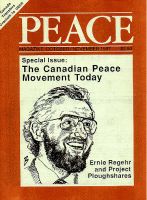
Peace Magazine Oct-Nov 1987, page 43. Some rights reserved.
Search for other articles by Jean Smith here
Search for other articles by Shirley Farlinger here
By Jean Smith
“Peace: The Next Frontier” was the title of the annual conference of senior students of History and Social Sciences in Peel. Run by the students with the assistance of their teachers, student councils, the Peel Board of Education, and the Association of History and Social Science Departments, the conference was sponsored by Spar Aerospace and the Canadian Institute for International Peace and Security.
The day began with a panel discussion on US/Soviet relations by Robert Matthews, a political scientist, Vladimir Noeosselov, from the Soviet Embassy, Bob Patterson, U.S. Vice-Consul and Neil Reeder, from External Affairs. The moderator was Vince Carlin of the CBC.
Asked about why there is so little about Russia in the news Mr. Noeosselov said that there was plenty available if the news media wanted to use it. Mr. Patterson told students to keep themselves informed but at the same time he made statements which some students doubted. He said that the U.S. supports the Contadora initiatives (which they don't). To the student who asked why the U.S. increases its military spending and cuts back on social programs, he answered that she didn't understand the situation even though she told him of the data she'd accumulated. He also said that the U.S. wants the Sandinistas to allow pluralism in their government -- strange comment, considering that there are eleven parties in the Nicaraguan government and only two in the U.S. government.
Seminars followed on: The Historical Role of Women in Peace; World Poverty and the Arms Race; Canadian Military Strategies: How Can We Keep Peace?; Nicaragua: From Somoza to Sandinistas and Contras; and Psychology of Violence, Psychology of Peace. Seminar leaders included Professor Eric Fawcett of Science for Peace, Anne Melman of the Voice of Women, Ken Fletcher of Veterans Against Nuclear Arms, Susan Goldberg of Parents for Peace, Colonel Chester Crowell, John C. Thompson of the Canadian Institute of Strategic Studies, and Dorothea Sheasby of Amnesty International
Three skits performed at noon depicted the human reactions to news of imminent annihilation from nuclear weapons. It was black humor at its best, performed with wit and imagination. The students' behavior showed clearly that they are committed and concerned. The success of the conference absolutely repudiated the claim about the lack of awareness on the part of today's youth made by the school board trustees who voted to disband the Critical Issues Committee in Toronto on April 1st (see June-July issue of PEACE Magazine, p46).
By Shirley Farlinger
Looking for resources for your school, church, or group? A good place to start is your local library. Some have a separate list of peace resources because they are scattered in many sections of the shelves. Many will order peace films and videos such as Saying Our Peace from the National Film Board free of charge. For information on how you can influence your local library to become more peace-minded, contact John Marshall, Library Information Workers for Peace, 416 /489-7165.
The United Church of Canada has peace resources for church and mid-week groups. An excellent choice is in the Loaves and Fishes curriculum, Volume 10, Fall, Two programs are outlined:
Remembering for Peace, a Remembrance Day church program for the Sunday before November 11, and Friends United as Neighbors. These contain songs, plays, a scavenger hunt, slides, crafts, and conflict resolution all relating to the theme of peace. Available at all United Church resource depots or UCC Division of Ministry, 85 St. Clair East, Toronto M4T 1M8.
The pamphlet, Toys Are For Fun (not for fighting) has been redone using suggestions from children from Clinton School, Toronto. For children and parents the pamphlets are popular for protesting the sale of war toys during the Christmas season.
The National Action Committee on the Status of Women (NAC) has also produced a pamphlet which lists peace groups and resources. Called "Women, Peace, and Politics," it may be ordered from NAC, 344 Bloor St. West, Suite 505, Toronto.
Peace Education Network Quebec is a group of organizations and individuals that helps parents, teachers, and community educators find resources for the Creation of a more peaceful, just, and secure world. PEN (Q) offers books, films, audio visual, and printed information: curricula and classroom material for pre-school through university; programs and events for conferences and community groups. Guest Speakers are available on these topics: "How to dual with the fear of nuclear war," "What about the Soviets?", "Social justice in the Third World," "Global education," "Women, militarism, and peace." Contact Rosemary Sullivan, Pigeon Hill Peacemaking Centre, 1965 St. Armand Rd., Pigeon Hill, Québec J0J 1T0.
November Symposium in Toronto
THE EMMANUEL COLLEGE CENTRE FOR THE STUDY OF RELIGION in Canada is planning a two-day symposium on the churches and peace for November 6 and 7, 1987. The primary aim is to serve our United Church constituency. Discussion will begin with responses to the briefs presented to the Special Joint Committee of the Senate and the House of Commons on Canada's International Relations by the Canadian Council of Churches and the Canadian Conference of Catholic Bishops. These reflection papers will be mailed to participants before the symposium.
The opening session Friday morning will feature a discussion by Ernie Regehr and others who drafted the briefs. They will comment on the theological understandings of the briefs and on developments in Canadian defence policy. Friday afternoon and Saturday morning will combine small group work with plenary time. On Friday evening, performances in memory of Margaret Laurence are being planned with the Toronto Dance Theatre.

Peace Magazine Oct-Nov 1987, page 43. Some rights reserved.
Search for other articles by Jean Smith here
Search for other articles by Shirley Farlinger here